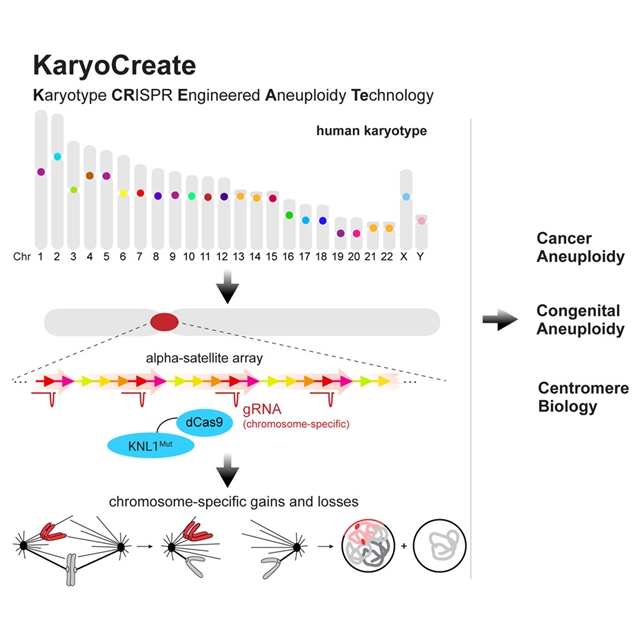
美国纽约大学Teresa Davoli研究团队开发出新技术通过靶向人类中心粒研究染色体特异性非整倍体。这一研究成果于2023年4月18日在线发表在国际学术期刊《细胞》上。
研究人员描述了KaryoCreate(核型CRISPR-工程非整倍体技术),该系统通过共同表达针对染色体特异性CENPA结合的ɑ-卫星重复序列的sgRNA,以及与突变体KNL1融合的dCas9,能够产生染色体特异性非整倍体。研究人员为24条染色体中的19条设计了独特和高度特异的sgRNA。这些构建体的表达导致了细胞后代中靶标染色体的错位和诱导增益或缺失,在10条染色体上验证了增益的平均效率为8%,缺失为12%(最高为20%)。
在结肠上皮细胞中使用KaryoCreate,研究人员发现18q染色体缺失(在胃肠道癌症中很常见)促进了对TGF-β的抵抗,这可能是由于多个基因的协同半数缺失。总的来说,研究人员描述了一种创新的技术,可在癌症和其他方面创造和研究染色体错位和非整倍体。
据悉,非整倍体,即染色体的增加或丢失,是癌症的一个标志。
附:英文原文
Title: KaryoCreate: A CRISPR-based technology to study chromosome-specific aneuploidy by targeting human centromeres
Author: Nazario Bosco, Aleah Goldberg, Xin Zhao, Joseph C. Mays, Pan Cheng, Adam F. Johnson, Joy J. Bianchi, Cecilia Toscani, Elena Di Tommaso, Lizabeth Katsnelson, Dania Annuar, Sally Mei, Roni E. Faitelson, Ilan Y. Pesselev, Kareem S. Mohamed, Angela Mermerian, Elaine M. Camacho-Hernandez, Courtney A. Gionco, Julie Manikas, Yi-Shuan Tseng, Zhengxi Sun, Somayeh Fani, Sarah Keegan, Scott M. Lippman, David Feny, Simona Giunta, Stefano Santaguida, Teresa Davoli
Issue&Volume: 2023-04-18
Abstract: Aneuploidy, the presence of chromosome gains or losses, is a hallmark of cancer. Here,we describe KaryoCreate (karyotype CRISPR-engineered aneuploidy technology), a systemthat enables the generation of chromosome-specific aneuploidies by co-expression ofan sgRNA targeting chromosome-specific CENPA-binding ɑ-satellite repeats togetherwith dCas9 fused to mutant KNL1. We design unique and highly specific sgRNAs for 19of the 24 chromosomes. Expression of these constructs leads to missegregation andinduction of gains or losses of the targeted chromosome in cellular progeny, withan average efficiency of 8% for gains and 12% for losses (up to 20%) validated across10 chromosomes. Using KaryoCreate in colon epithelial cells, we show that chromosome18q loss, frequent in gastrointestinal cancers, promotes resistance to TGF-β, likelydue to synergistic hemizygous deletion of multiple genes. Altogether, we describean innovative technology to create and study chromosome missegregation and aneuploidyin the context of cancer and beyond.
DOI: 10.1016/j.cell.2023.03.029
Source: https://www.cell.com/cell/fulltext/S0092-8674(23)00326-4
